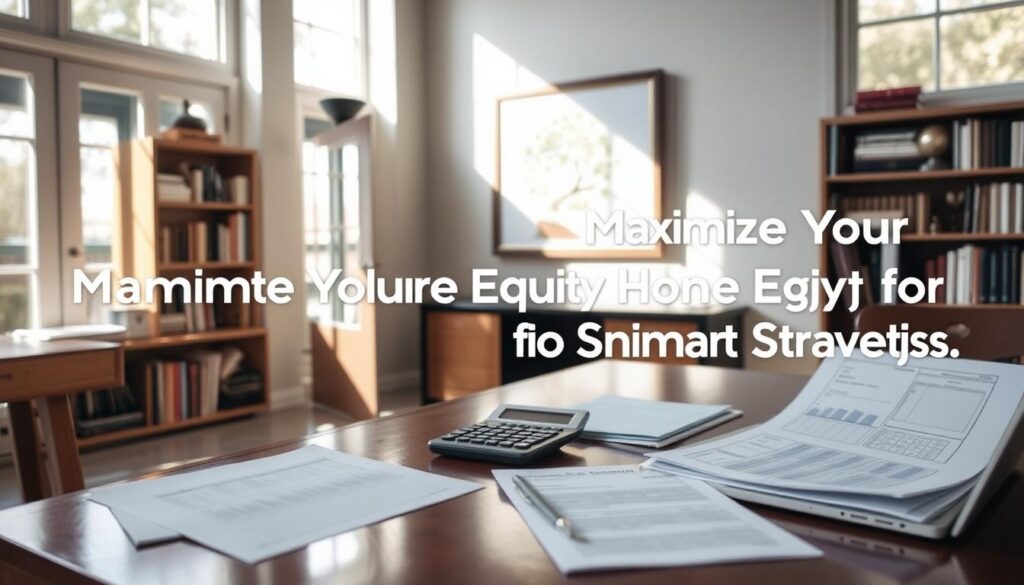Did you know that 83% of U.S. homeowners could tap into their home equity to access over $6 trillion in potential funds? That’s the power of home equity investment, a tool many overlook. With average interest rates for home equity loans currently 5.5%—far below the 16% typical for credit cards—this strategy offers a smarter way to grow wealth.
Unlock home equity means turning your home’s value into opportunities. Whether renovating, funding education, or starting a business, home equity benefits let you borrow against your property at favorable terms. Recent data from CBS News shows homeowners with 20%+ equity grow their net worth 3x faster than those who don’t leverage it.
Imagine using your home’s value without selling it. Home equity investment lets you access cash while keeping your property. With rates near historic lows, now is the time to learn how to maximize this hidden resource.
Understanding Home Equity: The Basics
Home equity basics start with knowing your home’s value. This foundational concept helps you track progress toward financial goals. Imagine your house as an evolving asset. As you pay your mortgage or local housing prices rise, your equity grows. Let’s break it down simply.
What is Home Equity?
Put simply, it’s the portion of your home you own outright. Suppose your home sells for $300,000 and your unpaid mortgage is $180,000. Your equity would be $120,000. This number increases as you pay off debt or market values climb. It’s your stake in one of your largest investments.
How Home Equity Contributes to Wealth
- Equity acts as a financial cushion for emergencies or opportunities.
- Rising property values turn long-term homeownership into a wealth-building tool.
- Accessing equity via loans or refinancing lets you reinvest in higher-value goals.
Understanding what is home equity transforms it from a vague term into a strategic resource. Over time, this asset can fund education, business ventures, or retirement plans. Building equity isn’t just about owning a home—it’s a step toward long-term wealth building.
Home Equity Investment Strategies
Choosing the right investment strategies can turn your home’s equity into a tool for financial growth. Here’s how to align home equity strategies with your goals:
- Cash-out refinancing: Replace your current mortgage with a larger loan, accessing the difference as cash. Ideal for large projects or debt consolidation.
- Home equity loan: A second mortgage offering fixed payments and predictable terms. Great for funding home improvements or education.
- Home equity investment partnerships: Work with investors to receive cash while retaining ownership. Lowers monthly obligations but may involve profit-sharing.
Compare interest rates and repayment terms before deciding. Ask: Does this wealth building strategy fit your long-term plans? A financial advisor can help weigh risks like market fluctuations or repayment constraints.
Every home equity strategy should reflect your timeline and comfort with risk. Whether renovating, starting a business, or diversifying assets, align your choices with goals to build lasting financial stability.
Determining Your Home’s Equity Value
Understanding your home’s equity requires precise home equity valuation. Start by choosing the right approach to avoid common mistakes. Let’s explore options that fit your needs.
Methods for Accurate Valuation
Two main paths exist to determine your property’s worth: online valuation tools and professional services. Each has unique benefits:
- Compare recent sales of similar homes in your area.
- Review your home’s age, size, and upgrades.
- Factor in market trends affecting local real estate.
Utilizing Online Tools and Professional Appraisals
Begin with free online valuation tools for a quick snapshot. Platforms like Zillow’s Zestimate or Realtor.com provide instant estimates. For deeper accuracy, a property appraisal by licensed professionals ensures compliance with IRS standards and loan requirements.
| Method | Cost | Time | Accuracy |
|---|---|---|---|
| Online Valuation Tools | Free-$100 | Minutes | Estimate |
| Property Appraisal | $300-$600 | 1-3 days | Official |
Combine both approaches for the clearest picture. Start online, then confirm with a certified property appraisal for major decisions.
Navigating the Home Equity Investment Process
Mastering the investment process starts with clear steps. Here’s how to move forward confidently:
- Check Eligibility: Lenders review your credit score, income, and current loan-to-value ratio.
- Submit an Online Application: Most platforms let you apply digitally in minutes.
- Property Assessment: A professional appraisal confirms your home’s market value.
- Finalize Terms: Review interest rates and repayment terms before signing.
| Scenario | Equity Example |
|---|---|
| Initial Equity (20% down payment) | $66,000 |
| After 1 Year (30-year mortgage at 7.91%) | + $28,800 |
Pro tip: Keep paperwork organized. Track your home equity process progress using tools like amortization calculators. Learn how appreciation impacts equity with real-world examples from experts.
Stay proactive during navigating home equity decisions. Avoid delays by ensuring all financial documents are up to date. Patience pays off—equity grows steadily as you follow these steps.
Maximizing Your Investment Returns
Turning home equity into opportunities starts with clear strategies. Focus on maximizing returns while nurturing financial growth without ignoring potential risks. Smart choices today shape your long-term stability.
Leveraging Equity for Financial Growth
Smart reinvestment is key. Consider these moves:
- Upgrade your home to boost its value—energy-efficient updates often pay off.
- Use equity to fund income-generating ventures, like rental properties or small businesses.
- Track market trends. Lower interest rates or rising demand in your area could mean better financial growth opportunities.
Risk Management Techniques
Protecting your investment starts with awareness. Follow these steps:
- Borrow cautiously—aim to keep loans under 80% of your equity to avoid risky debt levels.
- Build an emergency fund. Sudden job loss or repairs shouldn’t force you to sell assets quickly.
- Consult certified financial advisors. They help align your strategy with personal goals and economic shifts.
Regularly review your plan. Economic changes, like predicted rate cuts, can open new avenues or reveal hidden risks. Stay flexible yet focused on your goals.
Loan vs. Investment: Making the Right Choice
Choosing between a loan vs investment for your home equity requires clarity on goals. Let’s break down options like home equity loans versus HELOC alternatives.

| Option | Home Equity Loan | HELOC Alternative |
|---|---|---|
| Fixed payments | Yes (monthly installments) | No (flexible draws) |
| Interest Rate | Fixed at loan origination | Variable, tied to market rates |
| Best For | Predictable budgets | Growing expenses |
Ask yourself: Do you need steady payments or HELOC alternatives with repayment flexibility? Fixed-rate home equity loans suit large one-time costs like renovations. Variable-rate HELOCs work better for projects costing more over time.
- Loans offer lump sums but lock you into terms.
- Investments in property upgrades can boost resale value.
- HELOC alternatives avoid fixed monthly payments but carry rate risks.
Compare interest costs using online calculators. Weigh short-term needs against long-term gains. Your choice affects credit scores and future borrowing power.
Integrating Home Equity Investment into Your Financial Plan
Incorporating home equity into financial planning can strengthen your overall strategy. Home equity isn’t just a passive asset—it’s a flexible tool to support personal financial goals. According to HomeLight, 68% of homeowners use equity to enhance their diversified portfolio, balancing risk and growth.
Building a Diversified Portfolio
Start by viewing your home as part of your assets. Consider these steps:
- Review current assets to identify gaps in your diversified portfolio
- Calculate how much equity aligns with your risk tolerance
- Consult a certified financial planner for tailored advice
Aligning Investment with Personal Goals
Match equity use to your personal financial goals using this guide:
| Goal Type | Use Case | Example |
|---|---|---|
| Short-term | Home improvements | Upgrade kitchen to boost resale value |
| Long-term | Retirement funding | Reinvest equity into stocks or rental properties |
Regularly revisit your plan to ensure equity decisions align with evolving financial planning priorities.
Understanding Tax Implications of Home Equity
When exploring home equity investments, understanding tax implications ensures you make informed decisions. The home equity tax rules vary based on how you use the funds. Let’s break down key points to simplify your tax planning.
- Mortgage Interest Deductions: Interest paid on home equity loans may qualify for deductions if used to buy, build, or improve your home.
- Tax Rules Changes: Check current IRS guidelines—using loans for non-home purposes might disqualify deductions.
- Selling Your Home: Profits up to $250,000 (single) or $500,000 (married) are tax-free if you’ve lived in the home at least two years.
Proper tax planning helps avoid surprises. For instance, failing to report home equity loan details could lead to audits. If you remodel your kitchen using equity loans, those expenses boost your home’s basis, lowering potential capital gains taxes later.
Talk with a tax advisor to align loans and investments with your goals. Small steps now save bigger headaches come tax season. Your financial future deserves clarity—start by knowing the tax implications today.
Success Stories and Case Studies
Real-world examples show how homeowners turn home equity into opportunities. Explore case studies where strategies like home equity loans transformed goals into reality. Learn from proven results to inform your own decisions.
Real-World Examples
A notable case study highlights how one platform facilitated over $7 million in loans, helping families renovate homes and expand. Over 3,000 offers were curated, giving borrowers competitive choices. Platforms like this onboarded 22 lenders, proving diverse options work. These success stories prove equity can fuel growth when managed wisely.
Lessons Learned from Homeowners
- Long-term client relationships (5+ years) built trust and repeat opportunities.
- 0% interest loan options reduced financial stress during projects.
- Integration of new lenders expanded access to tailored solutions.
Review detailed analysis here. For further insights, visit HEIExplained. Every success story offers a roadmap to navigate equity investments confidently.
Expert Tips for Home Equity Investment Success
Maximizing your home equity investment requires more than just understanding the basics. These expert tips and insights from professionals like financial advisor Matt Richardson can help you navigate decisions confidently.
Key Strategies to Remember
Follow these actionable steps to turn home equity advice into results:
- Work with certified appraisers to confirm your property’s true value
- Set clear financial goals before taking on new loans
- Review loan terms annually to adjust repayment plans
Avoiding Common Pitfalls
| Pitfall | Solution |
|---|---|
| Over-leveraging debt | Keep loan-to-value ratios below 80% |
| Ignoring market trends | Track local housing market reports monthly |
| Skipping professional reviews | Consult mortgage brokers every 3-5 years |
These expert tips highlight how small steps prevent major setbacks. Remember: common pitfalls like rushed decisions often lead to missed opportunities. By following structured home equity advice, you protect both your property and your financial future.
Conclusion
This summary shows how home equity can become a powerful tool in your financial journey. By understanding valuation methods, like online tools and professional appraisals, you gain clarity on your equity’s potential. The strategies discussed—like diversifying your portfolio and aligning investments with personal goals—help turn equity into opportunities for growth.
In conclusion, home equity investments require careful planning. Review risk management techniques and tax implications to avoid pitfalls. Remember, success comes from informed choices, not rushed decisions. Case studies highlight that homeowners who use equity wisely often see long-term benefits, from debt consolidation to funding home improvements.
Final thoughts: Start by assessing your equity value. Consult financial advisors or use trusted resources to guide your next steps. Every decision should fit your unique financial picture. With the right approach, home equity isn’t just an asset—it’s a stepping stone toward achieving your goals. Take time to explore options, and prioritize choices that align with your future.



